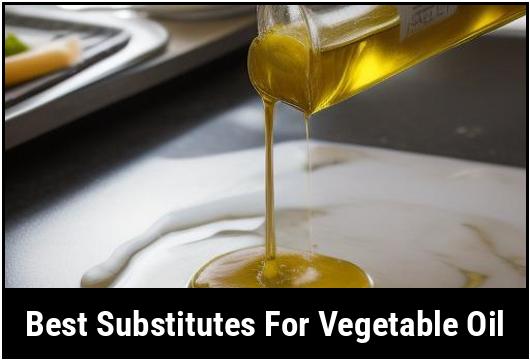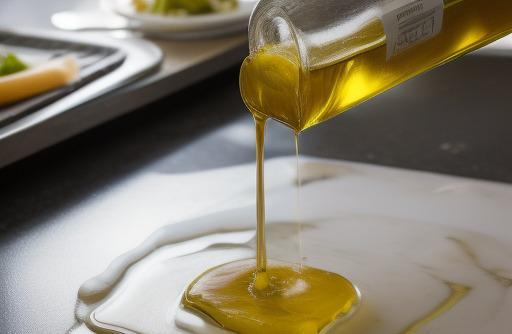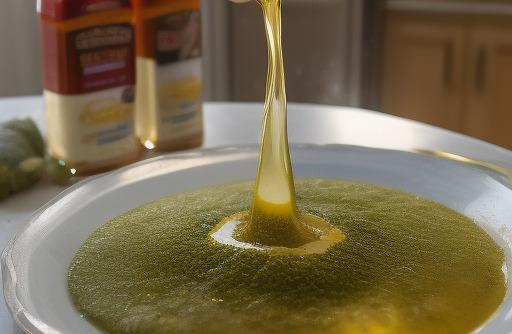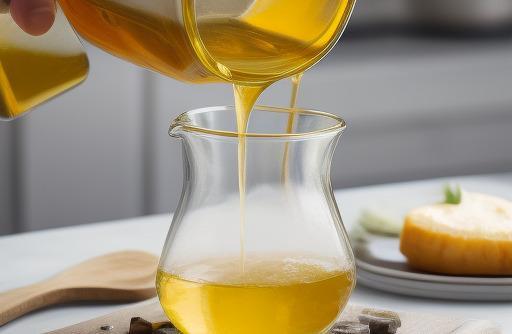- You are here:
- Home »
- Food Substitutes
- » Best Substitutes For Vegetable Oil
Best Substitutes For Vegetable Oil

Vegetable oil is a common ingredient in many recipes, but what do you do if you run out or simply don’t have any on hand? Thankfully, there are several great substitutes for vegetable oil that can come to the rescue. Whether you’re looking for healthier alternatives or need a specific flavor profile, there are options available to suit your needs. In this article, we will explore the best substitutes for vegetable oil and provide tips on how to use them effectively in your cooking.
Key Takeaways
- Vegetable oil can be replaced with various substitutes depending on the desired outcome.
- Substitutes for vegetable oil can provide different flavors, textures, and health benefits.
- Olive oil, coconut oil, avocado oil, and applesauce are among the best substitutes for vegetable oil.
Why You Need A Substitute For Vegetable Oil
There are several reasons why you may need to substitute vegetable oil in your cooking. The most common reasons include:
-
Out of Stock: You may find yourself in a situation where you’ve run out of vegetable oil and need a suitable replacement.
-
Health Concerns: Vegetable oil is often high in unhealthy fats, such as trans fats and omega-6 fatty acids. If you’re looking for a healthier alternative, you can opt for a substitute that offers nutritional benefits.
-
Flavor Preference: Depending on the recipe, vegetable oil may not provide the desired flavor profile. Substituting it with a different oil can enhance the taste and aroma of your dish.
Types Of Substitutes For Vegetable Oil

When it comes to substituting vegetable oil, there is a wide range of options available. The choice of substitute depends on the desired outcome, whether it’s a different flavor profile, better nutritional value, or a specific texture. The most common types of substitutes for vegetable oil include:
-
Olive Oil: Olive oil is a versatile substitute that is readily available in most kitchens. It adds a distinct flavor to dishes and is suitable for sautéing, frying, or baking. Extra virgin olive oil is a healthier option as it contains beneficial antioxidants.
-
Coconut Oil: Coconut oil is an excellent substitute that provides a unique flavor and aroma. It has a high smoke point, making it suitable for high-heat cooking methods like frying. Coconut oil solidifies at lower temperatures, so it can also be used as a butter substitute in baking.
-
Avocado Oil: Avocado oil is a healthy substitute for vegetable oil, as it contains monounsaturated fats that are beneficial for heart health. It has a mild flavor and a high smoke point, making it versatile for various cooking methods.
-
Applesauce: Applesauce is a great substitute for vegetable oil in baking. It adds moisture to the recipe and acts as a binding agent. Applesauce also adds a subtle sweetness to the final product, making it ideal for muffins, cakes, and cookies.
-
Greek Yogurt: Greek yogurt can be used as a substitute for vegetable oil in certain recipes, such as pancakes or muffins. It adds moisture and richness to baked goods while reducing the fat content.
-
Nut Butters: Nut butters like almond butter or peanut butter can be used as a substitute for vegetable oil in baking. They add a nutty flavor and provide moisture to the recipe. However, keep in mind that this substitution may alter the taste and texture of the final product.
Best Substitutes For Vegetable Oil

-
Olive Oil: As mentioned earlier, olive oil is one of the best substitutes for vegetable oil. It is rich in monounsaturated fats and offers various health benefits. Extra virgin olive oil is the preferable option for its superior taste and nutritional value. It works well for baking, sautéing, and light frying. However, it’s not recommended for deep frying due to its low smoke point.
-
Coconut Oil: Coconut oil is another top choice when it comes to replacing vegetable oil. It has a distinctive flavor and adds a tropical touch to dishes. Coconut oil is solid at room temperature but melts quickly when heated. It works best in recipes that benefit from its flavor profile, such as curries, stir-fries, and baked goods. Opt for unrefined or virgin coconut oil for the best taste and health benefits.
-
Avocado Oil: Avocado oil is a healthy substitute that offers a mild, buttery flavor. It is rich in monounsaturated fats and vitamin E. Avocado oil has a high smoke point, making it suitable for frying and grilling. It can also be used as a dressing or drizzled over salads. Due to its relatively mild taste, avocado oil is a versatile option that works well in various recipes.
-
Applesauce: Applesauce is an excellent substitute for vegetable oil in baking. It adds moisture to the recipe and can reduce the overall fat content. Replace equal amounts of vegetable oil with applesauce in your baking recipes. Keep in mind that using applesauce may result in a denser texture, so adjust the other ingredients accordingly. Additionally, choose unsweetened applesauce to avoid adding unnecessary sweetness to your baked goods.
Choosing The Right Substitute For Vegetable Oil

When choosing a substitute for vegetable oil, consider the following factors:
-
Flavor: Think about the flavor profile you want to achieve in your dish. Olive oil adds a distinct taste, while coconut oil offers a tropical flavor. Avocado oil has a subtle, buttery taste, and applesauce adds a touch of sweetness. Consider how the substitute will complement the other ingredients in your recipe.
-
Smoke Point: The smoke point is the temperature at which an oil starts to break down and produce smoke. Different substitutes have varying smoke points. If you plan to cook at high temperatures, opt for oils with high smoke points like coconut oil or avocado oil. For lower-heat cooking or baking, olive oil or applesauce may be suitable.
-
Nutritional Content: Consider the nutritional benefits of the substitute. If you’re looking for a healthier option, choose substitutes like olive oil, avocado oil, or applesauce that offer beneficial fats or reduce the overall fat content. Keep in mind that some substitutes, like nut butters, may increase calorie and fat content.
-
Texture: Some substitutes may alter the texture of the final product. For example, using applesauce instead of vegetable oil can result in a denser texture. Consider how the substitution will affect the desired texture of your dish.
Cooking With Substitutes For Vegetable Oil

When cooking with substitutes for vegetable oil, it’s essential to keep the following tips in mind:
-
Quantity Conversion: In most cases, you can replace vegetable oil with an equal amount of the substitute. However, some substitutes may affect the texture or flavor of the final product. Experiment with the quantity to achieve the desired outcome. Start by replacing half of the vegetable oil with the substitute and adjust as needed.
-
Flavor Considerations: Certain substitutes have strong flavors, so keep in mind how they will impact the taste of your dish. For instance, using olive oil instead of vegetable oil in a cake may alter the flavor profile significantly. Consider the suitability of the substitute for the specific recipe you’re making.
-
Baking with Applesauce: When using applesauce as a substitute for vegetable oil in baking, keep in mind that it adds moisture to the recipe. Adjust the other wet and dry ingredients accordingly to maintain the proper consistency of the batter or dough.
Recipes Using Substitutes For Vegetable Oil
Here are a few recipes where you can successfully substitute vegetable oil with other ingredients:
1. Olive Oil Roasted Vegetables
Ingredients:
- Assorted vegetables (such as carrots, bell peppers, zucchini, and eggplant)
- 2 tablespoons olive oil
- Salt and pepper to taste
Instructions:
- Preheat the oven to 400°F (200°C).
- Wash and chop the vegetables into bite-sized pieces.
- In a large bowl, toss the vegetables with olive oil, salt, and pepper until evenly coated.
- Spread the vegetables in a single layer on a baking sheet.
- Roast the vegetables in the preheated oven for 25-30 minutes or until they are tender and slightly caramelized.
- Serve as a side dish or use as a filling for wraps or sandwiches.
2. Coconut Oil Chocolate Chip Cookies
Ingredients:
- 1 cup all-purpose flour
- 1/2 teaspoon baking soda
- 1/4 teaspoon salt
- 1/2 cup coconut oil, melted
- 1/2 cup granulated sugar
- 1/2 cup brown sugar
- 1 large egg
- 1 teaspoon vanilla extract
- 1 cup chocolate chips
Instructions:
- Preheat the oven to 350°F (180°C). Line a baking sheet with parchment paper.
- In a medium bowl, whisk together the flour, baking soda, and salt.
- In a separate large bowl, cream together the melted coconut oil, granulated sugar, and brown sugar until well combined.
- Beat in the egg and vanilla extract until smooth.
- Gradually add the dry ingredients to the wet ingredients and mix until just combined.
- Stir in the chocolate chips.
- Drop rounded tablespoons of the dough onto the prepared baking sheet, spacing them about 2 inches apart.
- Bake for 10-12 minutes or until lightly golden around the edges.
- Allow the cookies to cool on the baking sheet for 5 minutes, then transfer them to a wire rack to cool completely.
Storage And Shelf Life Of Substitutes
Most substitutes for vegetable oil have a decent shelf life if stored properly. Here are some storage tips for common substitutes:
-
Olive Oil: Store olive oil in a cool, dark place to prevent it from going rancid. It can be kept for up to two years if stored correctly.
-
Coconut Oil: Coconut oil has a stable shelf life and can last up to two years. Store it in a cool, dry place away from direct sunlight.
-
Avocado Oil: Avocado oil has a longer shelf life compared to other oils due to its high monounsaturated fat content. It can last up to one year when stored properly.
-
Applesauce: Store opened applesauce in the refrigerator and consume it within one week. Unopened jars can be stored in a cool, dark pantry for several months.
Conclusion
Having an alternative to vegetable oil is essential when you need to substitute it in your cooking. Whether you’re looking for a healthier option, a specific flavor profile, or need to reduce the overall fat content in your recipe, there are several substitutes available. Olive oil, coconut oil, avocado oil, and applesauce are some of the best options to consider. Remember to choose a substitute that complements your dish, consider the smoke point, and adjust the quantity as needed. With these tips in mind, you can confidently replace vegetable oil and still achieve delicious and satisfying results in your cooking.
FAQS
What Are The Top Substitutes For Vegetable Oil In Cooking And Baking?
The best alternatives to vegetable oil are coconut oil, olive oil, avocado oil, grapeseed oil, and sunflower oil. Each of these oils has its unique properties and flavors that can be used in various types of dishes and cuisines.
Can I Use Butter As A Substitute For Vegetable Oil In Baking?
Yes, you can use unsalted butter as an alternative to vegetable oil in baking. However, the ratio of butter to vegetable oil may vary as the butter has a higher fat content. It’s best to use it in combination with other neutral oils like canola or grapeseed oil to avoid overpowering the flavor of the dish.
Are There Any Plant-based Substitutes For Vegetable Oil?
Yes, there are several plant-based alternatives to vegetable oil, such as coconut oil, avocado oil, and flaxseed oil. These oils are rich in healthy fats and offer a variety of flavors for cooking and baking.
Is It Possible To Substitute Vegetable Oil With Applesauce?
Yes, it’s possible to substitute vegetable oil with applesauce in baking as it adds a natural sweetness and moisture to the dish. However, it only works well in baked goods like cakes, muffins, and quick-breads.
Can I Use Peanut Oil As A Substitute For Vegetable Oil?
Yes, peanut oil is a good substitute for vegetable oil, especially in frying and high-heat cooking, as it has a high smoke point and neutral flavor. However, people with peanut allergies should avoid using peanut oil.
Sources
About the Author Jenny
I'm Jenny, a housewife with an unwavering passion for food. My culinary journey began with my grandmother's kitchen, and it's now a full-fledged food blog. I've turned my love for cooking into a creative outlet, sharing recipes and stories with a global community of fellow food enthusiasts. It's proof that being a housewife can also mean pursuing your passions and savoring life's delectable moments.
